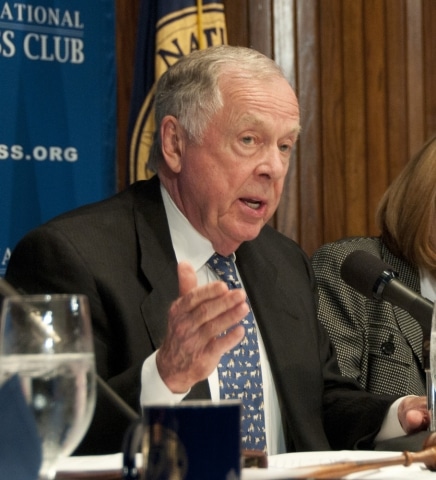On November 13, Clean Energy Fuels (CEF) signed a deal with General Electric (GE) to purchase its natural gas vehicle fueling assets in an effort to expand what it describes as “America’s Natural Gas Highway.”
CEF is owned on a 20.8 percent basis by T. Boone Pickens, energy magnate and owner of the hedge fund, BP Capital. Andrew Littlefair, President and CEO of CEF, described the deal as one of the “most significant milestones in Clean Energy’s history.”
The deal, “will enable trucks to operate [on natural gas] coast to coast and border to border.”
Forbes dug into the nuts-and-bolts of the deal:
In particular, Clean Energy has agreed to buy two MicroLNG plants from GE Oil and Gas (with up to $200 million in GE financing), to be operational by 2015. These modular units can quickly liquefy natural gas off of any pipeline, producing up to 250,000 gallons per day – enough to fuel 28,000 trucks – while minimizing the associated physical footprint.
In summer 2011, CEF signed another big deal with Chesapeake Energy it coined the “Declaration of Energy Independence,” with Chesapeake giving $150 million in capital to CEF to bolster its natural gas vehicle infrastructure.
Natural gas vehicles are an underexamined side of the battle brewing over the future of hydraulic fracturing (“fracking”) in the North America, but a key niche market controlled by the likes of CEF and Chesapeake Energy.
Locking in Demand for Shale Gas, Fracking the Future
According to a recent report published by Food and Water Watch, only 1-percent of vehicles currently on the road in the United States are fueled by natural gas. Though 1-percent may seem trivial, Food and Water Watch believes it’s a key mechanism to ensure the “shale gas bubble” doesn’t pop, writing,
Locking-in future increases in demand for U.S. natural gas — through increased consumption in the transportation and electricity sectors and through increased exports to foreign markets — appears to be part of the industry’s long-term strategy for ensuring that natural gas prices are high enough to make shale gas development profitable.
CEF has big plans for natural gas vehicles and says it hopes to have 150 filling stations by the end of 2013. Shell Oil also has its sights on building 100 stations as well, according to Forbes.
“America’s Natural Gas Highway,” given the climate and ecosystem impacts of fracking the future, looks much more like what the legendary band AC/DC would describe as a “Highway to Hell.”
Photo Credit: Shutterstock | Albert H. Teich
Subscribe to our newsletter
Stay up to date with DeSmog news and alerts







